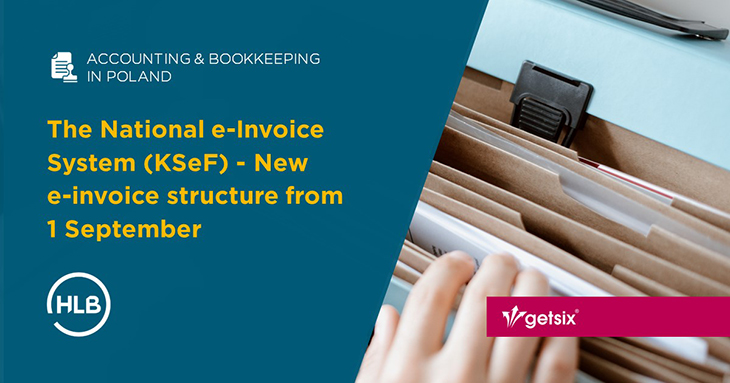The National e-Invoice System (KSeF) – New e-invoice structure from 1 September
Currently, the National e-Invoice System (KSeF) operates on a voluntary basis. However, the Ministry of Finance is consistently working to assist taxpayers in transitioning to the mandatory issuance of invoices within this system. To simplify the implementation process of KSeF, from 1 September 2023, taxpayers will adopt a new electronic invoice format – FA(2). The features developed under the voluntary system will remain once it becomes mandatory. This is why it’s essential to adapt to most of the anticipated functionalities now. Many businesses have delayed their integration with KSeF, waiting for the introduction of the announced second version of the structure.
The Ministry emphasized that with the introduction of the new structure, there’s a noticeable increase in interest in integrating with KSeF and the system itself.
At present, a standard invoice usually contains around 20 fields filled with various data. While the VAT amendment and the introduction of KSeF don’t foresee significant changes regarding invoice data, an analysis of the structured invoice reveals that after the changes, the number of fields will increase to about 300.
New Electronic Invoice Structure FA(2)
Starting from September 1, 2023, the electronic invoice structure FA(2) will come into effect, refining aspects not covered in the FA(1) structure. It still encompasses three types of fields:
- mandatory
- essential
- optional
Mandatory Data
Taxpayers are required to provide information in mandatory fields as these are stipulated in the VAT law, including the invoice elements stated in art. 106e section 1. Properly filling out these fields is crucial for the correctness of the invoice issued in KSeF. Mandatory information constitutes approximately 20% of the entire e-invoice structure. It primarily includes essential data for drafting the sales document, such as the seller’s and buyer’s names, issuance date, and service provision date.
It’s worth noting that when issuing e-invoices, it’s crucial to include indicators that specify the absence of certain conditions. Although this isn’t a requirement for printed invoices, it’s mandatory in the KSeF system.
Essential data
Taxpayers need to provide information in essential fields if specific conditions related to that field are met. About 30% of the e-invoice structure consists of essential data. Not filling out these required fields won’t be a technical error, but it could be a substantive error. This means the KSeF system might accept the invoice even if, for example, it has an incorrectly entered VAT rate. If a contractor or a person reviewing the invoices detects a substantive error, the seller will be obligated to correct it.
Optional data
Taxpayers aren’t obligated to fill out optional fields since they don’t directly influence the correctness of the invoice structure. However, they may be required due to other legal regulations or customs adopted by the taxpayer during the sales transaction documentation. Optional data constitutes almost 50% of the entire structure, which may include, for instance, an invoice footer with any text or information about the company’s share capital.
According to the data provided by the Ministry of Finance, from the beginning of January 2022 to August 8, 2023, within the KSeF production environment, taxpayers issued almost 67 thousand e-invoices. Additionally, nearly 957 entities regularly use this system to issue sales-related documents.
Even though the official launch of the National e-Invoice System is planned in less than a year, it’s beneficial to acquaint oneself with this platform now. The Ministry of Finance has made system testing available to all interested parties. It’s an excellent opportunity to prepare in advance for using a tool that will soon become standard for all entrepreneurs operating in Poland. It’s advisable to seize this opportunity to be prepared for upcoming changes and to avoid potential challenges in the future.
Learn more about the National e-Invoicing System (KSeF) on our website: National e-Invoicing System (KSeF)
If you have any questions regarding this topic or if you are in need for any additional information – please do not hesitate to contact us:
CUSTOMER RELATIONSHIPS DEPARTMENT

ELŻBIETA NARON
Head of Customer Relationships
Department / Senior Manager
getsix® Group
***





